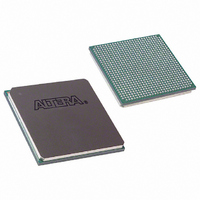EP1S10F780I6N Altera, EP1S10F780I6N Datasheet - Page 473

EP1S10F780I6N
Manufacturer Part Number
EP1S10F780I6N
Description
IC STRATIX FPGA 10K LE 780-FBGA
Manufacturer
Altera
Series
Stratix®r
Datasheet
1.EP1S10F484I6N.pdf
(864 pages)
Specifications of EP1S10F780I6N
Number Of Logic Elements/cells
10570
Number Of Labs/clbs
1057
Total Ram Bits
920448
Number Of I /o
426
Voltage - Supply
1.425 V ~ 1.575 V
Mounting Type
Surface Mount
Operating Temperature
0°C ~ 85°C
Package / Case
780-FBGA
Lead Free Status / RoHS Status
Lead free / RoHS Compliant
Number Of Gates
-
Available stocks
Company
Part Number
Manufacturer
Quantity
Price
Company:
Part Number:
EP1S10F780I6N
Manufacturer:
ALTERA
Quantity:
3 000
- Current page: 473 of 864
- Download datasheet (11Mb)
Introduction
Stratix I/O Banks
Altera Corporation
July 2005
S52005-3.2
To achieve high data transfer rates, Stratix devices support True-
LVDS
serializer/deserializer (SERDES) circuitry for each differential I/O pair.
Stratix SERDES circuitry transmits and receives up to 840 megabits per
second (Mbps) per channel. The differential I/O interfaces in Stratix
devices support many high-speed I/O standards, such as LVDS,
LVPECL, PCML, and HyperTransport
speed modules are designed to provide solutions for many leading
protocols such as SPI-4 Phase 2, SFI-4, 10G Ethernet XSBI, RapidIO,
HyperTransport technology, and UTOPIA-4.
The SERDES transmitter is designed to serialize 4-, 7-, 8-, or 10-bit wide
words and transmit them across either a cable or printed circuit board
(PCB). The SERDES receiver takes the serialized data and reconstructs the
bits into a 4-, 7-, 8-, or 10-bit-wide parallel word. The SERDES contains the
necessary high-frequency circuitry, multiplexer, demultiplexer, clock,
and data manipulation circuitry. You can use double data rate I/O
(DDRIO) circuitry to transmit or receive differential data in by-one (
or by-two (
1
This chapter describes the high-speed differential I/O capabilities of
Stratix programmable logic devices (PLDs) and provides guidelines for
their optimal use. You should use this document in conjunction with the
Stratix Device Family Data Sheet section of the Stratix Device Handbook,
Volume 1. Consideration of the critical issues of controlled impedance of
traces and connectors, differential routing, termination techniques, and
DC balance gets the best performance from the device. Therefore, an
elementary knowledge of high-speed clock-forwarding techniques is also
helpful.
Stratix devices contain eight I/O banks, as shown in
I/O banks on each side contain circuitry to support high-speed LVDS,
LVPECL, PCML, HSTL Class I and II, SSTL-2 Class I and II, and
HyperTransport inputs and outputs.
TM
differential I/O interfaces which have dedicated
Contact Altera Applications for more information on other B
values that the Stratix devices support and using
Quartus
B = 1 and B = 7 in
×
2) modes.
5. High-Speed Differential I/O
®
Interfaces in Stratix Devices
II software. Stratix devices currently only support
×
7 mode.
TM
technology. Stratix device high-
Figure
×
7-mode in the
5–1. The two
×
5–1
1)
Related parts for EP1S10F780I6N
Image
Part Number
Description
Manufacturer
Datasheet
Request
R

Part Number:
Description:
CYCLONE II STARTER KIT EP2C20N
Manufacturer:
Altera
Datasheet:

Part Number:
Description:
CPLD, EP610 Family, ECMOS Process, 300 Gates, 16 Macro Cells, 16 Reg., 16 User I/Os, 5V Supply, 35 Speed Grade, 24DIP
Manufacturer:
Altera Corporation
Datasheet:

Part Number:
Description:
CPLD, EP610 Family, ECMOS Process, 300 Gates, 16 Macro Cells, 16 Reg., 16 User I/Os, 5V Supply, 15 Speed Grade, 24DIP
Manufacturer:
Altera Corporation
Datasheet:

Part Number:
Description:
Manufacturer:
Altera Corporation
Datasheet:

Part Number:
Description:
CPLD, EP610 Family, ECMOS Process, 300 Gates, 16 Macro Cells, 16 Reg., 16 User I/Os, 5V Supply, 30 Speed Grade, 24DIP
Manufacturer:
Altera Corporation
Datasheet:

Part Number:
Description:
High-performance, low-power erasable programmable logic devices with 8 macrocells, 10ns
Manufacturer:
Altera Corporation
Datasheet:

Part Number:
Description:
High-performance, low-power erasable programmable logic devices with 8 macrocells, 7ns
Manufacturer:
Altera Corporation
Datasheet:

Part Number:
Description:
Classic EPLD
Manufacturer:
Altera Corporation
Datasheet:

Part Number:
Description:
High-performance, low-power erasable programmable logic devices with 8 macrocells, 10ns
Manufacturer:
Altera Corporation
Datasheet:

Part Number:
Description:
Manufacturer:
Altera Corporation
Datasheet:

Part Number:
Description:
Manufacturer:
Altera Corporation
Datasheet:

Part Number:
Description:
Manufacturer:
Altera Corporation
Datasheet:

Part Number:
Description:
CPLD, EP610 Family, ECMOS Process, 300 Gates, 16 Macro Cells, 16 Reg., 16 User I/Os, 5V Supply, 25 Speed Grade, 24DIP
Manufacturer:
Altera Corporation
Datasheet:












